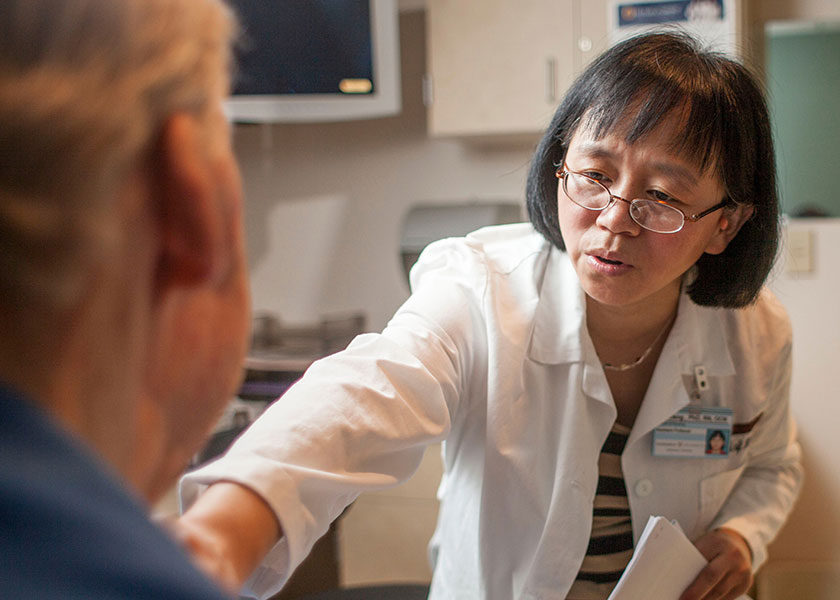
Vanderbilt University School of Nursing (VUSN) Assistant Professor Jie Deng, Ph.D., R.N., OCN, FAAN, has been awarded a $789,000 research scholar grant by the American Cancer Society to develop and test a self-care program for head and neck cancer survivors diagnosed with secondary lymphedema and fibrosis (LEF).
LEF causes swelling and the development of hard tissue in the head and neck region following cancer treatment. It impacts approximately 75 percent of the more than half a million head and neck cancer survivors in the U.S.
“Although not curable, LEF can be managed to minimize impact,” Deng said. “LEF therapy needs to be lifelong, so it’s important to develop a self-care regimen that patients can perform regularly.”
Some patients have rated LEF as worse than their cancer, Deng said. Patients may experience external and/or internal swelling that causes decreased range of motion in the jaw, neck and shoulders; skin tightening and pain; and problems with critical functions like swallowing, speaking and breathing. These and other effects such as body image issues and lack of mobility decrease quality of life.
The prevailing treatment for LEF is complete decongestive therapy (CDT), which consists of initial lymphedema therapy done with a certified lymphedema therapist and then long-term self-care administered by the patient or caregiver. CDT includes manual lymph drainage, compression with bandaging and fitted garments, exercise and skin care. The goal of CDT, particularly the self-care component, is to prevent progression of LEF and reduce negative health outcomes.
Deng said that currently there isn’t a uniform standard for long-term self-care and that some patients don’t receive any self-care training. In her two-stage project, she will complete development of a LEF self-care program, then conduct trials to identify the optimal regimen before moving onto a definitive Phase III trial.
Previous research by Deng revealed barriers to both initial therapy and to the self-care phase. That work, sponsored by the Vanderbilt Clinical Translational Research Scholar Program, provided the preliminary data for the new study.
“Inadequate self-care is a potentially remediable issue,” she said. “A standardized program that is feasible, safe and effective is needed. More than half of the participants failed to adhere to self-care regimens due to lack of motivation, limited knowledge or training, lack of continued guidance and perception of low self-efficacy.”
In Phase I, Deng and her co-investigators will create a LEF self-care program based on the Information-Motivation-Behavioral Skills (IMB) model of health behavioral change. They will develop and produce IMB-driven self-care educational manuals and video that will specifically address knowledge, behavioral skills and motivation issues faced by head and neck cancer survivors. They will also develop one-on-one self-care training conducted by a certified lymphedema therapist that is designed to ensure acquisition and retention of the care instructions. Phase II research will address the feasibility of the LEF self-care program and determine if variables such as provider follow-up increase self-efficacy.
Deng said that the intervention also addresses issues of health care disparity. “Our research found that 37 percent of HNC survivors live in rural areas without certified lymphedema therapists,” Deng said. “About 20 percent have annual household incomes of less than $20,000. This intervention is designed to provide those patients with a safe, innovative, accessible and practical self-care regimen.”
While this study focuses specifically on LEF in HNC survivors, Deng said that it could have further application. “Our prototype has the potential to be adapted and used for other chronic cancer survivorship-related challenges,” she said. In today’s health care environment, self-care for those with chronic conditions is becoming increasingly popular and necessary, she said.
Co-investigators on the project are Barbara Murphy, M.D., professor of Medicine and director of Head and Neck Oncology at Vanderbilt-Ingram Cancer Center, and Mary Dietrich, Ph.D., VUSN professor of Statistics/Measurements. Russell Rothman, M.D., M.P.P., professor of Medicine and director of the Vanderbilt Center for Health Services Research; Elizabeth Weiner, Ph.D., R.N., FAAN, VUSN senior associate dean for Informatics; and Jana Lauderdale, Ph.D., R.N., FAAN, VUSN assistant dean for Office of Diversity and Inclusion, are consultants on the study.
Deng’s research is supported by a Research Scholar Grant, RSG-16-207-01 – PCSM from the American Cancer Society.
The American Cancer Society is the largest non-government, nonprofit funding source of cancer research in the United States. Since 1946, the American Cancer Society has funded research and training of health professionals to investigate the causes, prevention and early detection of cancer, as well as provided assistance to patients and their families.
Photo:
Jie Deng (right) with a research participant.
Image: Daniel Dubois